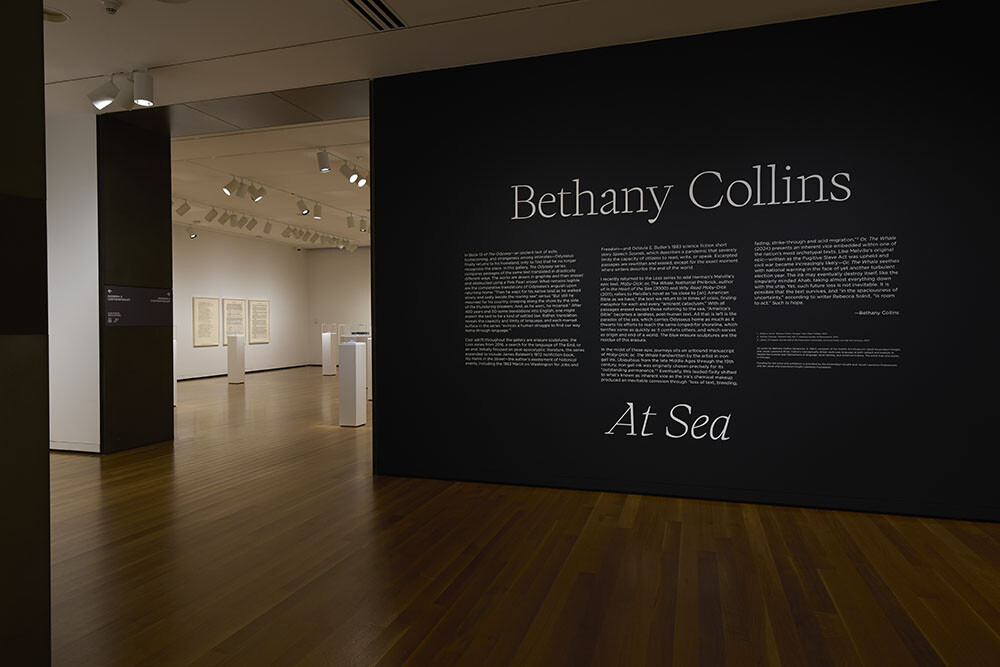
The Seattle Art Museum (SAM) presents Bethany Collins: At Sea (November 14, 2024–May 4, 2025), the solo exhibition for the recipient of the 2023 Gwendolyn Knight and Jacob Lawrence Prize. The Chicago-based artist also received a $15,000 award. The exhibition will be in SAM’s Gwendolyn Knight and Jacob Lawrence Gallery and debut 15 works by the artist that have never been on view.
Awarded biannually since 2009 to an early career Black artist—defined loosely as an artist in the first decade of their career—the Gwendolyn Knight and Jacob Lawrence Prize recognizes artists who have already contributed significantly to contemporary artistic practice and whose prominence is on the rise. Previous recipients of the prize are now leaders in the field: Titus Kaphar (2009), Theaster Gates (2011), LaToya Ruby Frazier (2013), Brenna Youngblood (2015), Sondra Perry (2017), Aaron Fowler (2019), and Lauren Halsey (2021).
Bethany Collins’s conceptually driven work takes language as both its subject and medium, exploring the nuances and intersections of language, racial identity, and American history. As a multidisciplinary artist, she employs various methods to physically alter existing texts, revealing their deeper meanings in the process. The artist’s work was previously shown at the Seattle Art Museum in Jacob Lawrence: The American Struggle (2021).
At Sea begins by inviting the viewer into the hero’s journey home of the ancient Greek epic The Odyssey. In her ongoing series of the same name, of which seven examples are on view, Collins transcribes passages of the text from different translations from the 1800s to early 2000s. Writing in graphite on Somerset paper, the artist uses a Pink Pearl eraser to obstruct and rework the text to highlight the variations between the translations. Collins reveals how the text continues to change over the course of 400 years and numerous English translations, illustrating what she describes as “the capacity and limits of language.”
Complementing these works is an extension of Collins’s 2016 Loss series, in which she searched for characterizations of the end of the world—or an end— in post-apocalyptic literature. For At Sea, the series expands to include James Baldwin’s 1972 nonfiction work No Name in the Street and Octavia E. Butler’s 1983 science fiction short story Speech Sounds. In her search for a language of “The End,” the artist reproduces excerpts on Somerset paper and erases everything except passages describing the end of the world, leaving only the material residue of her eraser shavings as the works’ final sculptural forms.
Also building on her Loss series, Collins focuses on Herman Melville’s 1851 novel Moby-Dick; or, The Whale. Using a blue eraser, Collins removes all passages except those referring to the sea, creating a sculpture of blue erasure residue. Leaving only the paradox of the sea, Collins explains, “terrifies some as quickly as it comforts others, and which serves as (an) origin and end of a world.”
The exhibition also features an unbound manuscript of Moby-Dick; or, The Whale handwritten by the artist with iron gall ink—an ink revered for centuries for its permanence but now known to be highly acidic, often eating away at the page over time. Through the work’s potential decay, Collins explores how future loss can be implied but not inevitable, carrying the weight of warning and hope. Considering that Melville’s work was written as the Fugitive Slave Act of 1850 was being upheld and the prospect of civil war was becoming more likely, Collins reflects that her work “seethes with national warning in the face of yet another turbulent election year.”
“As we were all floundering during the 2020 election year, it was such a buoy to make work for Jacob Lawrence: The American Struggle, an exhibition of the artist’s newly reunited Struggle series as well as contemporary projects by Hank, Derrick and I,” says Bethany Collins. “Like Lawrence, I too am drawn to an epic, a comprehensive truth, the all-ness of it. The exhibition traveled from the Peabody Essex Museum to SAM in 2021, but the pandemic grounded me in Chicago. It will be a joy to finally return to Seattle and an honor to be a part of Gwendolyn and Jacob’s long legacy of support for Black artists.”
Collins’s solo exhibition at SAM is curated by Catharina Manchanda, SAM’s Jon and Mary Shirley Curator of Modern and Contemporary Art. Sandra Jackson-Dumont, Director and CEO of Lucas Museum of Narrative Art, selected the artist this year. From 2009 to 2021, she was the founding curator of the prize’s exhibitions. Jackson-Dumont was formerly the Frederick P. and Sandra P. Rose Chairman of Education at the Metropolitan Museum of Art; prior to that, she was SAM’s former Deputy Director for Education and Public Programs and Adjunct Curator in Modern and Contemporary Art.

